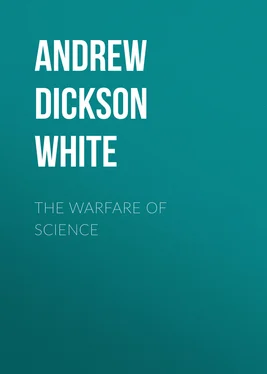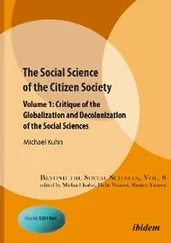Andrew Dickson White - The Warfare of Science
Здесь есть возможность читать онлайн «Andrew Dickson White - The Warfare of Science» — ознакомительный отрывок электронной книги совершенно бесплатно, а после прочтения отрывка купить полную версию. В некоторых случаях можно слушать аудио, скачать через торрент в формате fb2 и присутствует краткое содержание. Жанр: foreign_prose, foreign_religion, Философия, foreign_psychology, foreign_antique, на английском языке. Описание произведения, (предисловие) а так же отзывы посетителей доступны на портале библиотеки ЛибКат.
- Название:The Warfare of Science
- Автор:
- Жанр:
- Год:неизвестен
- ISBN:нет данных
- Рейтинг книги:5 / 5. Голосов: 1
-
Избранное:Добавить в избранное
- Отзывы:
-
Ваша оценка:
- 100
- 1
- 2
- 3
- 4
- 5
The Warfare of Science: краткое содержание, описание и аннотация
Предлагаем к чтению аннотацию, описание, краткое содержание или предисловие (зависит от того, что написал сам автор книги «The Warfare of Science»). Если вы не нашли необходимую информацию о книге — напишите в комментариях, мы постараемся отыскать её.
The Warfare of Science — читать онлайн ознакомительный отрывок
Ниже представлен текст книги, разбитый по страницам. Система сохранения места последней прочитанной страницы, позволяет с удобством читать онлайн бесплатно книгу «The Warfare of Science», без необходимости каждый раз заново искать на чём Вы остановились. Поставьте закладку, и сможете в любой момент перейти на страницу, на которой закончили чтение.
Интервал:
Закладка:
Nor was this argument confined to the theologians of the Roman Church; Melanchthon, Protestant as he was, had already used it in his attacks upon the ideas of Kopernik and his school. 44 44 Initia Doctrinæ Physicæ , pp. 220, 221.
In addition to this prodigious engine of war, there was kept up a terrific fire of smaller artillery in the shape of texts and scriptural extracts.
But the little telescope of Galileo still swept the heavens, and the next revelation announced was the system of mountains and valleys in the moon. This was a signal for another attack. It was declared that this, coupled with the statement that the moon shines by light reflected from the sun, was a contradiction of the statement in Genesis that the moon is a "great light" like the sun. To make the matter worse, a painter, placing the moon in a religious picture in its usual position beneath the feet of the Blessed Virgin, outlined on its surface mountains and valleys; this was denounced as a sacrilege logically resulting from the astronomer's heresy.
The next struggle was aroused when the hated telescope revealed spots upon the sun, and their motion, which indicated the sun's rotation. Monsignor Elci, head of the University of Pisa, forbade the Professor of Astronomy, Castelli, to mention these spots. Father Busaeus, at the University of Innspruck, forbade the astronomer Scheiner to allow the new discovery to be known there. At the College of Douay and the University of Louvain it was expressly placed under the ban, and this became the general rule among the Catholic universities and colleges of Europe. The Spanish universities were specially intolerant of this and similar ideas, 45 45 See Ticknor , Hist. of Span. Literature , vol. iii.
and up to a recent period they were strictly forbidden in the most important university of all—that of Salamanca. In 1820 the Abbé Settele, professor at the College of Rome, having announced a work on Optics and Astronomy, the master of the sacred palace, under the authority of the old decrees against the teachings of Kopernik and Galileo, forbade the publication, and it was not until 1822 that Pope Pius VII. sanctioned a decision of the Inquisition permitting such teachings. 46 46 See Th. Martin , Galilée , pp. 34, 208, and 266.
Such are the consequences of placing the instruction of men's minds in the hands of those mainly absorbed in the work of saving men's souls. 47 47 See Martin , Galilée , pp. 34 and 208; also a curious note in the earlier English editions, Lyell , Principles of Geology , Introduction.
Nothing could be more in accordance with the idea recently put forth by the Bishop of Montpellier, that the Church is alone fully empowered to promulgate scientific truth or direct university instruction; but science gained the victory here also. News came of observations of the solar spots, not only from Galileo in Italy, but from Fabricius in Holland. Father Scheiner then endeavors to make the usual treaty; he promulgates a pseudo-scientific theory—a statement based on a "religious science"—which only provokes derision.
But the war grew more and more bitter, and the principal weapons in it are worth examining. They are very easily examined; you may pick them up on any of the battle-fields of science; but on that field they were used with more effect than on almost any other. These weapons are two epithets: "Infidel" and "Atheist."
The battle-fields of science are thickly strewn with these. They have been used against almost every man who has ever done anything new for his fellow-men. The list of those who have been denounced as infidel and atheist includes almost all great men of science—general scholars, inventors, philanthropists. The deepest Christian life, the most noble Christian character, have not availed to shield combatants. Christians like Isaac Newton and Pascal and John Locke and John Milton, and even Howard and Fénelon, have had these weapons hurled against them. Of all proofs of the existence of a God, those of Descartes have been wrought most thoroughly into the minds of modern men; and yet the Protestant theologians of Holland sought to bring him to torture and to death by the charge of atheism, and the Roman Catholic theologians of France prevented the rendering of any due honors to him at his burial. 48 48 For curious exemplification of the way in which these weapons have been hurled, see lists of persons charged with "infidelity" and "atheism," in Le Dictionnaire des Athées , Paris, An. viii. Also, Lecky , History of Rationalism , vol. ii., p. 50. For case of Descartes, see Saisset , Descartes et ses précurseurs , pp. 103, 110.
These epithets can hardly be classed with civilized weapons. They are burning arrows. They set fire to great masses of popular prejudices; smoke rises to obscure the real questions; fire bursts forth at times to destroy the attacked party. They are poisoned. They go to the hearts of loving women, they alienate dear children; they injure the man after life is ended, for they leave poisoned wounds in the hearts of those who loved him best—fears for his eternal happiness—dread of the Divine displeasure. Of course, in these days, these weapons, though often effective in disturbing good men and in scaring good women, are somewhat blunted. Indeed, they not unfrequently injure assailants more than assailed. So it was not in the days of Galileo; they were then in all their sharpness and venom.
Yet far more vile than the use even of these weapons—vile indeed beyond belief—was the attack by the Archbishop of Pisa.
It is a remark made by one of the most moderate and judicially fair of modern philosophic historians, that, of all organizations this world has known, the Roman Church has caused most undeserved woe and shed most innocent blood; but, in the whole terrible succession of Torquemadas and Arbues and Granvilles, the vilest enemy of the human race is probably this same Archbishop of Pisa.
This man, whose cathedral is more truly consecrated by the remembrance of Galileo's observation of the lamp swinging before its altar, than by all the church services of a thousand years, began a siege against the great philosopher.
Galileo, after his discoveries had been denounced as contrary to Scripture, had been induced to write to the Duchess Christine and to his friend Castelli two letters, to show that his discoveries might be reconciled to Scripture. The archbishop saw his opportunity: he determined to get hold of these letters and exhibit them as proofs that Galileo had uttered heretical views of theology and the Scriptures, and thus to bring the astronomer hopelessly into the clutch of the Inquisition. The archbishop begs Castelli, therefore, to let him see the original letter in the handwriting of Galileo. Castelli declines; the archbishop then, while, as is now revealed, writing constantly and bitterly to the inquisitors against Galileo, professes to Castelli the greatest admiration of Galileo's genius, and a sincere desire to know more of his discoveries. Castelli is seduced by this; but Galileo sturdily forbids sending the letter, and the archbishop is obliged to resort to open attack.
The whole struggle to crush Galileo and to save him would be amusing were it not so fraught with evil. There were intrigues and counter-intrigues, plots and counter-plots, lying and spying, and in the thickest of this seething, squabbling, screaming mass, priests, bishops, archbishops, cardinals, and even the future Pope Urban VIII. himself. It is most suggestive to see in this crisis of the Church, on the eve of the greatest errors in church policy the world has known, in all the efforts and deliberations of these consecrated leaders of the Church, at the tomb of the Prince of the Apostles, no more sign of the guidance or presence of the Holy Spirit than in a caucus of New York politicians.
Читать дальшеИнтервал:
Закладка:
Похожие книги на «The Warfare of Science»
Представляем Вашему вниманию похожие книги на «The Warfare of Science» списком для выбора. Мы отобрали схожую по названию и смыслу литературу в надежде предоставить читателям больше вариантов отыскать новые, интересные, ещё непрочитанные произведения.
Обсуждение, отзывы о книге «The Warfare of Science» и просто собственные мнения читателей. Оставьте ваши комментарии, напишите, что Вы думаете о произведении, его смысле или главных героях. Укажите что конкретно понравилось, а что нет, и почему Вы так считаете.












